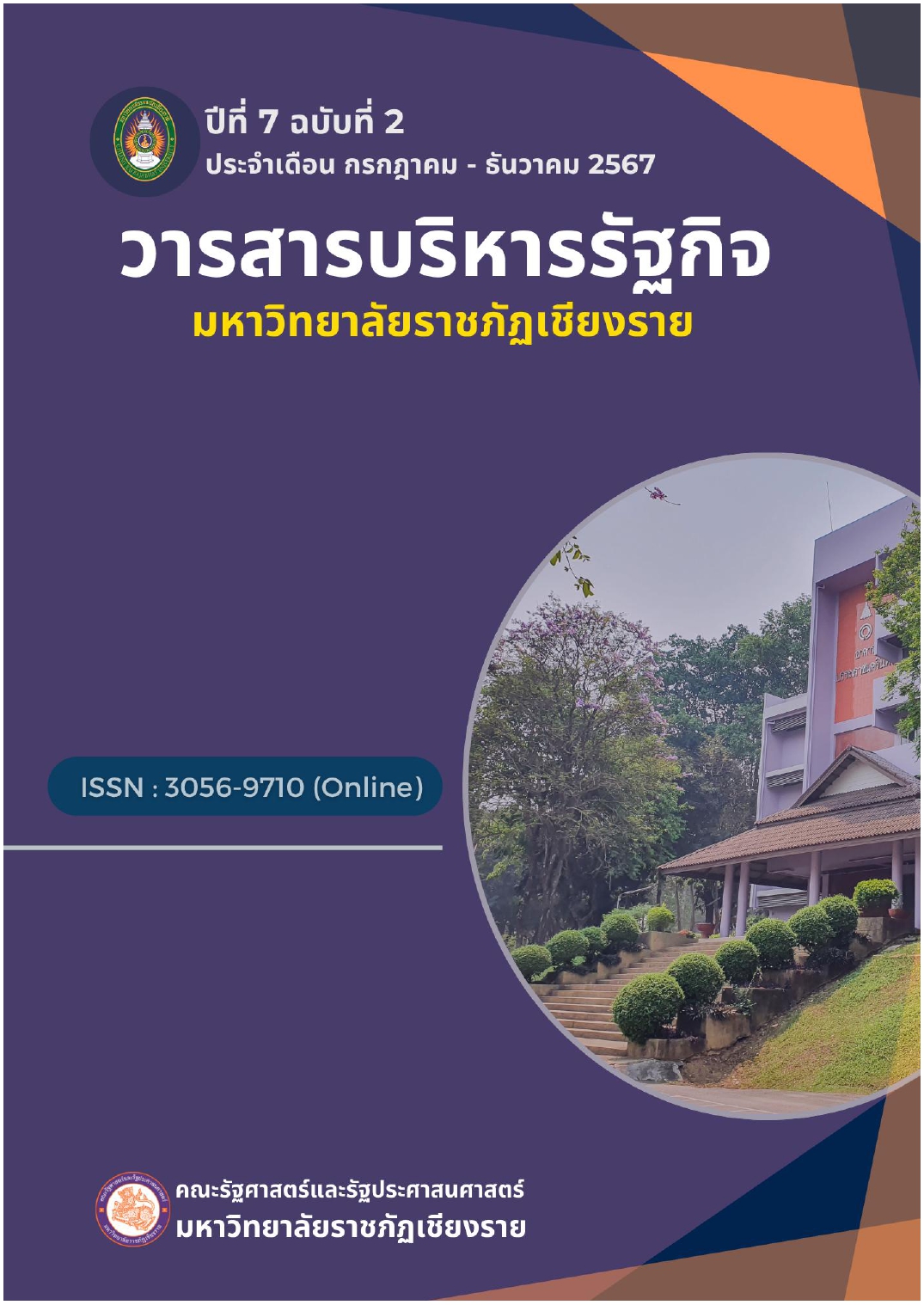The Impact of Human Resource Development Innovation on Managerial Skills of Junior Executives in Borthong 33 Industrial Estate
Main Article Content
Abstract
This research aimed to study "The impact of human resource development innovation on the managerial skills of junior executives in the Borthong 33 industrial estate." The objectives were: 1) to investigate the level of human resource development innovation affecting managerial skills, and 2) to examine the factors of innovation that influence managerial skills. The study population consisted of 243 junior executives in the Borthong 33 industrial estate. Data were collected using a questionnaire, which was verified for quality. Data analysis employed descriptive and inferential statistics, using stepwise multiple regression analysis with a significance level of 0.05. The findings indicated that human resource development innovations in education, on-the-job development, and training all positively impact managerial skills. Training had the greatest effect, followed by on-the-job development and education. The results show that training, focusing on management-related skills and knowledge, significantly enhances junior executives' managerial capabilities. The regression analysis confirmed that all three factors had a statistically significant positive effect, with training having the highest coefficient, followed by on-the-job development and education, highlighting the importance of training in managerial skills development within the industrial estate context.
Article Details
References
เกรียงไกรยศ พันธุ์ไทย. (2564). กลยุทธ์การพัฒนาทรัพยากรมนุษย์เชิงบูรณาการ: กุญแจสู่ความเป็นเลิศ. วารสารพัฒนบริหารศาสตร์, 51(3), 239-257.
ณัฐพล บัวเปลี่ยนสี และ ปรีดาพร อารักษ์สมบูรณ์. (2564). การพัฒนารูปแบบนวัตกรรมการจัดการทรัพยากรมนุษย์ในยุคดิจิทัล สำหรับเขตพัฒนาพิเศษภาคตะวันออก. วารสารมณีเชษฐาราม วัดจอมมณี, 4(2), 1-16.
ธัญญารัตน์ พรหมสุทธิ์ และคณะ. (2564). การพัฒนาสมรรถนะทรัพยากรมนุษย์เพื่อรองรับยุคประเทศไทย 4.0. วารสารวิทยาลัยสงฆ์นครลำปาง, 10(1), 228-243.
ปัทมา รูปสุวรรณกุล (2562).การจัดการทรัพยากรมนุษย์และประสิทธิภาพการปฏิบัติงานในส่วนอุตสาหกรรมโรจนะจังหวัดพระนคศรีอยุธยา. วารสารมนุษยศาสตร์และสังคมศาสตร์, 13(1), 41-54.
วรเดช เพลิดพริ้ง และ วินัย รังสินันท์. (2565). ปัจจัยด้านการจัดการทรัพยากรมนุษย์และการพัฒนาทรัพยากรมนุษย์ที่ส่งผลต่อประสิทธิภาพองค์การของกลุ่มอุตสาหกรรมยานยนต์แห่งอนาคตในโครงการระเบียงเศรษฐกิจพิเศษภาคตะวันออกแห่งประเทศไทย. วารสารวิจัยมหาวิทยาลัยเวสเทิร์น มนุษยศาสตร์และสังคมศาสตร์, 8(3), 176-189.
วนิดา หมัดเบ็ญหมาน. (2562). การพัฒนาแนวทางนวัตกรรมการพัฒนาบุคลากรของมหาวิทยาลัยหาดใหญ่โดยใช้โมเดล Knowledge Management Maturity Model (KMMM). สารนิพนธ์วิศวกรรมศาสตรมหาบัณฑิต สาขาวิชาการจัดการอุตสาหกรรม มหาวิทยาลัยสงขลานครินทร์.
วีระยุทธ พรพจน์ธนมาศ และ วงพักตร์ ภู่พันธ์ศรี. (2562). การพัฒนาทรัพยากรมนุษย์ในองค์กรปกครองส่วนท้องถิ่นจังหวัดระยอง. วารสารจันทรเกษมสาร, 25(1), 141-155.
สิทธปวีย์ ธนโสตถิกุลนันท์. (2562). ตัวแบบประสิทธิภาพการบริหารจัดการธุรกิจการขนส่งทางแม่น้ำในภาคกลางของประเทศไทย. วิทยานิพนธ์ปรัชญาดุษฎีบัณฑิต บัณฑิตวิทยาลัย มหาวิทยาลัยสยาม.
สุดารัช ชัยศรี. (2563). การพัฒนาทรัพยากรมนุษย์ของพนักงานผู้ให้บริการทางการแพทย์
และการพยาบาล ของโรงพยาบาลเอกชนขนาดใหญ่ในเขตกรุงเทพมหานคร. วารสารนวัตกรรมการบริหารและการจัดการ, 8(2), 33-45.
Banmairuroy, W., Kritjaroen, T., & Homsombat, W. (2022). The effect of knowledge-oriented leadership and human resource development on sustainable competitive advantage through organizational innovation's component factors: Evidence from Thailand’s new S-curve industries. Asia Pacific Management Review, 27(3), 200-209.
Engelsberger, A., Halvorsen, B., Cavanagh, J., & Bartram, T. (2022). Human resources management and open innovation: the role of open innovation mindset. Asia Pacific Journal of Human Resources, 60(1), 194-215.
Katz Robert L. (1974). Skills of an Effective Administrator. Harward Business Review.
Sharma, M., Luthra, S., Joshi, S., & Kumar, A. (2022). Analysing the impact of sustainable human resource management practices and industry 4.0 technologies adoption on employability skills. International Journal of Manpower, (ahead-of-print).
Tidd, J., Bessant, J., & Pavitt, K. (2001). Managing innovation: Integrating technological market and organizational change. Chicester: Wiley.
Garavan, T. N., Carbery, R., & Rock, A. (2021). Human Resource Development: Learning, Knowledge and Strategic Integration. Palgrave Macmillan.
Schraeder, M., Swamidass, P. M., & Morrison, R. (2020). Performance Management: Systems, Strategies, and Tools. Routledge.


